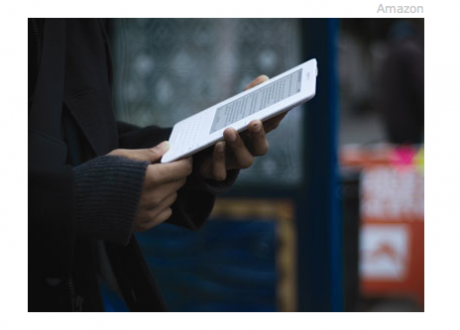
Image of Kindle 2 from Amazon
I confess I should have gotten my Kindle by now. I look at it. I admire it. I put off making the final commitment. Now Amazon launches its Kindle 2, and, again, I am fascinated by it, must have it, but still have not produced the $359 to get it. Don’t ask me why. It was going to be my birthday present to myself, but I opted for a David Gerstein sculpture which looks perfect in my living room where it brings an explosion of colors in the midst of a totally white environment.
But, back to the Kindle 2. An article in The Economist (Feb. 14-20 edition) titled “Well Read” is probably all I needed to read to go online and buy my Kindle 2. I am especially intrigued by how it ties this new and attractive gadget to newspapers. Here is a quote from the article:
It’s now only a matter of time until absolutely all books become available, and properly formatted, for mobile phones. Google, an internet giant that has been scanning and digitising books for inclusion in its search engine, now offers thousands of books that are in the public domain free on mobile phones. It seems likely that, eventually, only books that have value as souvenirs, gifts or artefacts will remain bound in paper. Newspapers and magazines are on the same trajectory. Their paper editions are in decline in most of the developed world, as readers opt for the web versions on their computers and laptops, or on smart-phones such as the iPhone. The Kindle could accelerate that shift since it also lets users subscribe to news publications, which are automatically delivered.
The article comparea Kindle 2 to that other most beautiful of indispensable items, Apple’s iPod. The iPod revolutionized the music industry and provided us with something we always wanted: the ability to select the songs we wanted from a CD, for example, and not have to buy the whole album. This makes perfect sense for me, especially in the case of a artists such as Norah Jones or Amy Winehouse, both of whom represent too much for me in an entire repertoire of 14 songs, but one or two feel just right.
With the Kindle 2 and newspaper reading, three questions arise:
1. Will I be able to “unbundle” my newspapers accordingly? Will I for example create my Kindle 2 Dream Newspaper Edition: The New York Times’ news, opinion and Art sections; USA Today’s LIFE section; the St. Petersburg Times’ Tampa Bay (local) section? If that is the case, get me the subscriptions department, please.
2. How graphic will the pages of the newspaper be? Or will this be a text-driven product? In other words, will my Kindle 2 newspaper experience be so thorough and satisfying that I will not need to go online, for example, to see that animated graphic of how the Obama stimulus package affects me?
3. How about advertising? Will the Kindle 2 provide a platform for traditional newspaper advertisers to appear on that little screen too?
I am sure these answers are there, we just need to find out. If you know, please chime in.
Paging Roger Fidler
Oh, yes, the Kindle 2 brings to mind my colleague and friend, Roger Fidler, the one pioneer in this business of reading newspapers on a tablet. Fidler, presently Director of Technology Initiatives at the Reynolds Journalism Institute (Columbia, Missouri), has been exploring and engineering the electronic tablet newspaper for years. A recent interview quoted Roger: “With the arrival of new generations of eReaders and improved, dedicated software, new ways of journalistic newshandling and distribution are becoming imperative”.
The time is here, Roger, no doubt. I will try to get with Roger for a One Minute Interview here. Meanwhile, I can see the Kindle 2, which as the name implies, ignites the fires that make us read, becoming a tool that will encourage storytelling. As I told a group of American reporters and editors last week, this may very well be the decade of the writers—-not that good writing has ever gone away. However, I think we are about to enter a period where writing as a craft inside newspapers and magazines will get more attention. We know people read. We know people even read long pieces, if they are well written. The new technology, I am convinced, will push writing and editing to a new, higher level, demanding the best editors and writers to produce stories that appeal to a demanding public, through a variety of platforms—-the Kindle 2 just one of them.
Kindle 2 is all about words. Nothing new here. We will just be able to carry more of them at one time in our briefcase. Yes, I should not procrastinate and get my Kindle 2 soon.
For the complete Economist article:
Electronic books are becoming popular. Will newspapers follow?
http://www.economist.com/business/displaystory.cfm?story_id=13109804
For a 2007 interview with Roger Fidler:
http://www.editorsweblog.org/analysis/2007/04/part_3_the_paperless_paper_int.php

To read TheRodrigoFino blog, in Spanish, go:
https://garciamedia.com/latinamerica/blog/

Today Rodrigo Fino writes about the introduction of a new design for Venezuela’s La Verdad,
TheMarioBlog posting #195